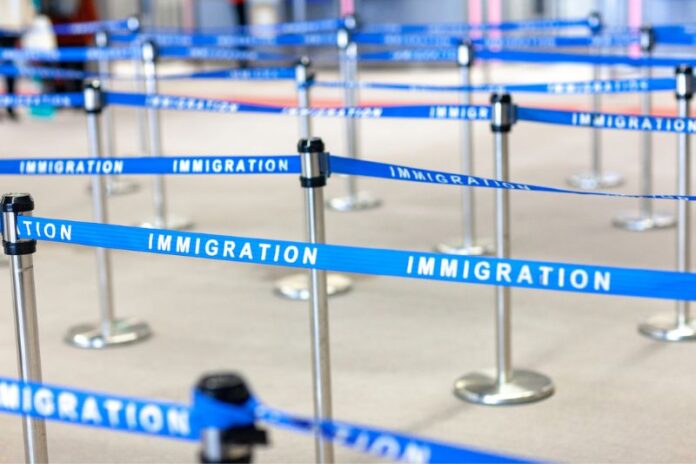More than two decades after Islamic terrorists exploited the U.S. government’s inefficient system for tracking foreigners who overstay visas, the problem is only getting worse with a startling 853,955 visa overstays in fiscal year 2022. A new report issued by the Department of Homeland Security (DHS) tries to downplay the severity of the situation by shining a light on the positive, that the overstay rate is a mere 3.67% compared to 96.33% of over 23 million nonimmigrants that departed the country on time in accordance with the terms of their admission.
The reality is that the latest available overstay figure is an alarming record-breaker for the U.S. and it indicates that national security is not being taken seriously by the government. At least four of the September 11 hijackers were in the United States with expired visas and all these years later the government—under both Democratic and Republican administrations—has not found a way to adequately track visa overstayers. After the 9/11 attacks Congress created a system to track the entry and exit of foreign nationals by using electronically scanned fingerprints and photographs. It was called the U.S. Visitor and Immigration Status Indicator Technology (US VISIT) and it was seriously flawed even though the government invested around a billion dollars over several years to get it going. It never worked properly, however.
In the meantime, a persistent crisis involving visa overstays has gripped the nation in years following the 2001 attacks. The investigative arm of Congress, the Government Accountability Office (GAO) found that nearly half of the nation’s illegal aliens entered the U.S. legally and overstayed their visa undetected. Other federal investigations have revealed that the U.S. has failed to properly remove millions who overstayed their visa, including DHS losing track of hundreds of dangerous foreigners that “could pose a national security or public safety concerns.” Every year the government fails to catch hundreds of thousands of foreign nationals who overstay their visa. In fiscal year 2015 it was more than half a million, including thousands from terrorist nations like Pakistan, Iraq, Yemen, Libya and Syria. A few years later the number of visa overstayers increased to 702,000. Among them was a Portuguese man with an expired visa charged in the gruesome kidnap and murder of a young woman whose body was found bound in a suitcase on a Connecticut street.
The latest figures included in the Fiscal Year 2022 Entry/Exit Overstay Report illustrate that the problem is much worse than previously reported, though DHS tries to sugarcoat it by highlighting that most foreigners left when they were supposed to. The agency also uses the excuse of the “unique challenges” due to COVID-19 and temporary changes in U.S. policy that allowed travelers to file for immigration benefits while out of status. Nevertheless, DHS is forced to recognize in the document that the record-breaking figure of 853,955 “presents the overstay rates of those who remained in the United States beyond their authorized period of admission with no evidence of an extension to their period of admission or adjustment to another immigration status.” This is very disturbing and deserves congressional scrutiny.
The new data shows that 9,005 Chinese citizens overstayed their student visa last fiscal year, accounting for around 16% of student or exchange visitor overstays. India is second in the category with 5,037 followed by 2,918 Colombians and 2,427 Brazilians. Venezuelans accounted for the largest number of short-term visitors with expired visas at 172,640 followed by Mexico with 123,623. Mexicans also accounted for the biggest chunk of overstays in temporary worker visas with 131,000 followed by India with 5,800. Throughout the report DHS appears to make excuses for the security lapses, writing in one instance that “determining lawful status requires more than matching entry and exit data.” As an example, the agency offers that “a person may receive a six-month period of admission upon entry and then subsequently apply for and receive an extension for the period of admission of up to six months from U.S. Citizenship and Immigration Services.” Identifying those extensions, changes, or adjustments of status are necessary steps to determine whether a person has overstayed the authorized period of admission, DHS stresses.


































